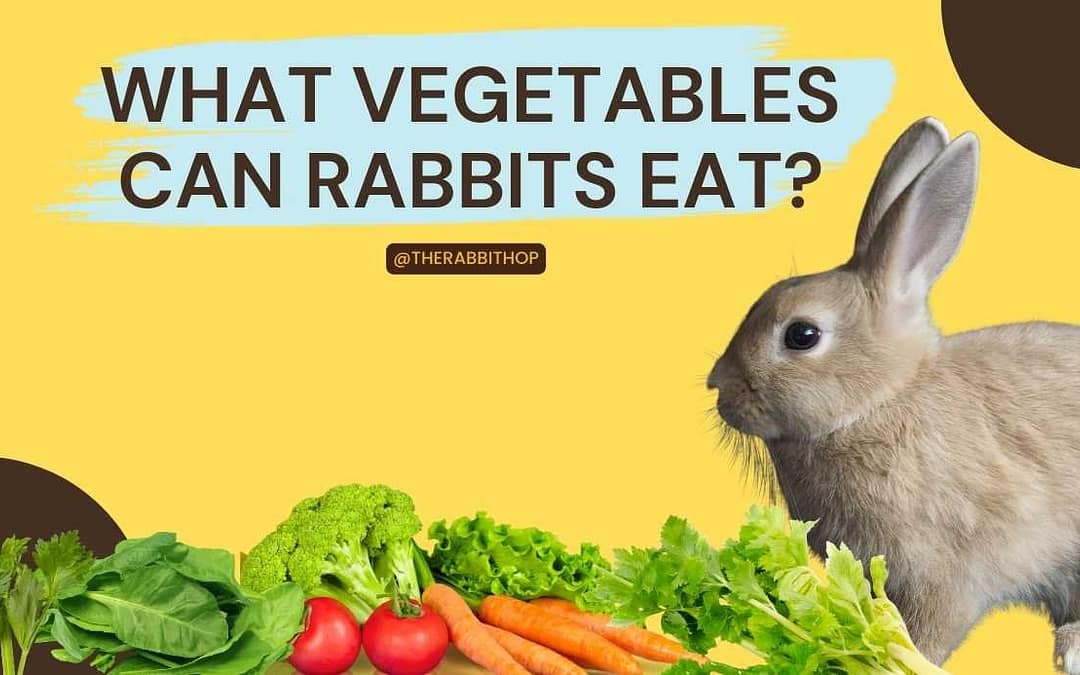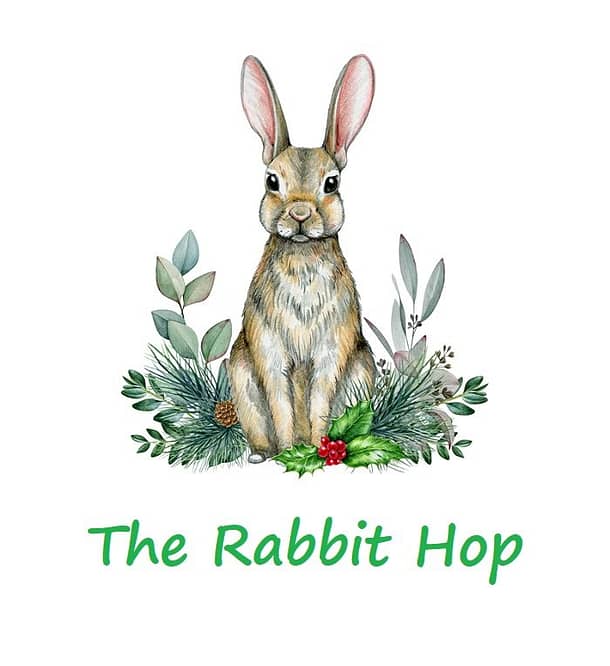Our rabbit pals love vegetables. In fact, they enjoy a vegan diet and should never be fed food that is not plant-based. But not all plants are safe for our bunny friends. What veggies can rabbits eat? What vegetables should never be fed to your pet rabbit?
Rabbits Love Vegetables! But What Vegetables Can Rabbits Eat?
First, let’s look at the obvious. Bugs Bunny always had carrots, and when it comes to rabbit snacks vegetables, are carrots the best food to feed your pet rabbit?
Can Rabbits eat carrots?
Most people assume that rabbits live on a diet of carrots and grass hay. But are carrots good for rabbits, especially when considering their health and nutritional needs? Should rabbits eat leafy green vegetables? And should they eat carrots?
Carrots contain a high amount of natural sugars. Our bunnies love chomping on them and might even crave that sugar fix. But moderation is key here. Your rabbit will enjoy a chunk of carrot occasionally. But carrots do not contain everything your rabbit needs for a healthy diet. And they contain too much sugar.
The high carbohydrate content of carrots causes another problem, too. Those carbs cause an imbalance in the gut flora which can lead to gastric issues, including the very serious GI statis.
Vets usually advise that you feed your rabbit a limited amount of carrots. But don’t forget those carrot tops. In fact, your pet rabbit often enjoys the greens as much as the carrot, itself.
Our suggestion: offer a chunk of carrot as an occasional treat, rather than a major part of your bunny’s diet.

Best vegetables rabbits can eat safely.
Is celery safe for rabbits?
Yes, celery is not only safe for your rabbit’s diet, it also provides important nutrients. Rabbits love to crunch on a stalk of fresh, raw celery plant.
How Much Celery Should I Feed My Rabbits?
First, let’s look at the obvious. Bugs Bunny always had carrots, and when it comes to a healthy rabbit diet and rabbit snacks, are carrots the best food to feed your pet rabbit? Half a stalk might be enough for a dwarf rabbit’s diet, while a Flemish Giant might benefit from an entire stalk each day. Remember that a variety of different foods, including rabbit diet and washed leafy green vegetables, is better than feeding your rabbit one type of vegetable. Each vegetable offers specific health benefits.
Can Rabbits Eat Cucumbers?
Rabbits enjoy fresh vegetables like cucumbers and usually love munching on them. While cucumbers are watery vegetables, they also contain vitamins and minerals that benefit your rabbit. Offering a variety of fresh veg for rabbits, such as leafy greens and colorful vegetables, can provide essential nutrients for their overall health and well-being.

rabbit eating lettuce
Is Lettuce Good for Rabbits?
Next to carrots, lettuce might be the a favorite for people to include in their rabbit’s diet. Lettuce is a green and wild rabbits eat greens, right?
Yes, but not exclusively. Feeding a small amount of lettuce each day does offer good health benefits. Choose dark, leaf lettuce varieties such as romaine, green leaf, and red leaf lettuce. Avoid the less nutrient dense varieties such as iceberg lettuce.
But remember, lettuce contains a lot of water. If you feed your rabbit too much lettuce and other watery vegetables, it can lead to health problems. Some rabbits develop diarrhea or watery poop. And over time, rabbits that eat lettuce exclusively,
Best Types of Lettuce
Some lettuce contains more water and less nutrients than other varieties. Generally speaking, the deep green leaf lettuces such as Green Leaf Lettuce and romaine lettuce offer more nutrition than lighter-colored iceberg lettuce. Red leaf lettuce is also a good choice for a treat.
Other leafy greens for pet rabbits
Our pet rabbits eat a variety of leafy greens, including **beet greens**, and benefit from these nutritious foods. Similar to romaine lettuce, the darker the leafy greens, the more nutrition they provide. When you feed your rabbit these, be careful not to overdo it. Most rabbits eat a variety of greens and do quite well. But too much, especially when first starting to feed them, can cause stomach upset and diarrhea. Below are list of vegetables rabbits can eat;
Some leafy vegetables that provide a good feed your rabbit will enjoy include
-
broccoli – stalks, stems, leaves
Broccoli provides a variety of textures for your bunny’s diet. Most rabbits eat the stems, the florets, and the leaves with great enthusiasm.
-
Arugula (rocket)
The tender leaves have a sharp mustard or peppery flavor which our rabbits seem to enjoy.
-
Bok choy (Chinese chard)
A member of the cabbage family, bok choy provides sturdy yet tender leaves with a crunch formation at the bottom. Rabbits relish these!
-
Collard greens (collards)
Similar to cabbage and kale, collard greens grow into long flat leaves. Pet rabbits enjoy the somewhat bitter flavor of raw collard greens and usually eat both the leaf and stem.
-
Celery greens
The leafy variety of celery greens, often called celery leaf, grows without the tough stalk that the well-known grocery variety has. Young rabbits eat celery leaves with great enthusiasm. Of course, they all love the typical stalk-style celery, too.
-
Dandelion greens
Free food? Yes, you can feed those dandelion greens, flowers, leaves, and stems from your yard. Just be sure they have not been sprayed with pesticides or weed killers. Or, set up the rabbit exercise pen and let your pet rabbit nibble away!
-
Kale
Another member of the cabbage family, kale comes in several varieties, each with a slight texture or color variation. All provide baby and adult rabbits with good nutrition and some active chewing on the stems and stalks.
-
Mustard greens
Rich, dark green with a strong mustard flavor, mustard greens are easy to grow and quick to vanish if your rabbit can get to them. They seem to enjoy the spicy flavor and the tender texture of these nutrition greens.
-
Rapini (broccoli raab)
Broccoli raab appears as thin broccoli stalks with small clusters of buds and smooth leaves. These leafy vegetables offer another slightly bitter choice that rabbits eat with great zest.
-
Spinach
Spinach offers a popular choice for leafy greens. You can feed your rabbit the tender baby spinach or allow it to grow into adult size, which has more texture and flavor.
-
Swiss chard
With a sweet but slightly bitter flavor, swiss chard is one of our favorites to feed to our rabbits. Maybe it’s the big leafy green at the end of those colorful stalks. They are usually red, orange, yellow, and sometimes green. Rabbits enjoy crunching on the stalks but also love those big leaves with a texture like a large spinach leaf.
-
Turnip greens
These grow as textured, fuzzy green leaves from the top of the turnip root. Turnip greens begin quite sweet but as they mature, they take on a bitter flavor. Our rabbits enjoy them at either stage of growth. I think the younger rabbits prefer the more tender texture of baby greens, though.
Effects of feeding your rabbit too much celery or other watery greens?
Ensure a well-balanced rabbit diet by incorporating a variety of greens, vegetables, and fruit. While these are essential, be cautious with watery greens like celery, as excessive consumption may lead to stomach issues and diarrhea. Prioritize a balanced approach to safeguard your rabbit’s health and prevent potential complications.
What are the water requirements of rabbits?
We find that rabbits do best with a continuous supply of fresh, clean water. Whether you use a water bottle or an open dish, make sure it is washed frequently and kept full of fresh water.
Note that your rabbit, even when thirsty, might refuse to drink his water if it is not clean or is stale. They seem to understand that bacteria build quickly.
Refresh the water each day, more often if needed.
Do I need to give my rabbit vitamins?
It’s best to check with your veterinarian for advice on supplements such as vitamins. Some rabbits need them but most do fine without.
Remember that if you feed good quality greens, vegetables, fruit, and hay, your rabbit’s diet should be quite complete.
Non-leafy vegetables for your rabbit’s diet
Your pet rabbit’s diet might include non-leafy vegetables, too. Rabbits eat a variety of raw vegetables including tomatoes, corn, green beans, and squash.
It’s important to remember that many vegetables, including tomatoes and corn, contain high levels of natural sugars. To avoid health problems, feed these as occasional treats, rather than as the major part of his diet.
Common Questions about feeding vegetables to rabbits
Can Rabbits Eat Tomatoes?
Yes, but in small amounts due to the sugar content.
Can rabbits eat squash?
Yes, rabbits love to chew on raw squash.
Can Rabbits Eat Corn?
Yes, but like tomatoes, corn contains high amounts of sugar. Feed only small amounts. Our rabbits like corn on the cob. Just cut a piece of corn into slices, leaving the kernals on the cob. One cob makes several feedings.
Can Rabbits Eat Cauliflower?
Cauliflower can cause gassy issues that can lead to bloating. Although a small amount is not harmful, it’s best to choose other vegetables.
Can rabbits eat potatoes or sweet potatoes?
While a small nibble of these is not harmful, potatoes and sweet potatoes are high in carbohydrates and thus should not be fed to your pet rabbit.
Why are fresh foods important for my rabbit’s diet?
Fresh foods, such as fresh hay, vegetables, and herbs, provide essential nutrients, vitamins, and hydration that contribute to your rabbit’s overall well-being. They also add variety and enrichment to their diet.
How do I determine the appropriate vegetable portion for my rabbit based on its body weight?
To determine the appropriate vegetable portion, feed your rabbit approximately 1 cup of fresh vegetables for every 4 pounds (1.8 kg) of body weight. Adjust the portions based on your rabbit’s weight to maintain a healthy balance.
Can rabbits eat leaks?
It’s crucial to err on the side of caution and refrain from allowing rabbits eat leeks. Despite conflicting online information, it’s important to note that leeks, belonging to the Allium family alongside onions and garlic, contain compounds like N-propyl disulfide. These substances can pose harm to rabbits, emphasizing the need to avoid introducing leeks into their diet, as even small amounts can be detrimental.
Checklist of foods to avoid feeding your rabbit
Of course, you need to know which vegetables not to feed your pet rabbit, too.
-
Onions, Garlic, Leeks
These are toxic to rabbits.
-
Mushrooms
Mushrooms are harmful to rabbits. Avoid feeding them.
-
Broad Beans, Kidney beans
Beans such as broad beans and kidney beans are gassy and cause stomach problems when fed to rabbits, whether raw or cooked. Avoid feeding them.
-
Potatoes, all varieties, sweet potatoes
As mentioned above, potatoes and sweet potatoes contain high amounts of carbohydrates and should not be fed to rabbits. A small amount is not harmful, but it’s best to avoid them.
Health benefits of feeding fresh produce to your rabbit
Your rabbit’s digestive system benefits from fresh vegetables and leafy greens. If you feed the suggested vegetables, avoiding those with very little nutritional value, your rabbit will be healthier. The variety of vitamins and minerals found in fresh produce will help keep your rabbit’s immune system strong, while providing essential nutrients for growth, muscle development, and overall health. Additionally, fresh produce will help stimulate your rabbit’s appetite, which can lead to greater consumption of hay. This helps avoid digestive problems associated with an exclusively dry diet.
You Might Also Enjoy Reading…



